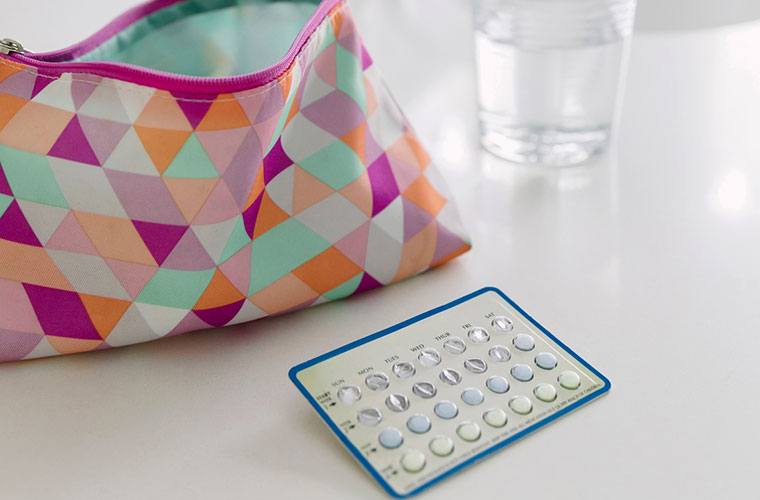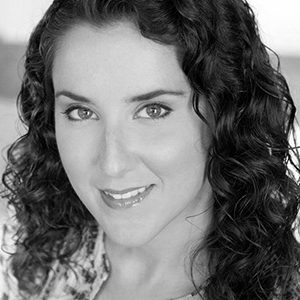Millions of women use hormonal birth control—to avoid pregnancy, to deal with acne, and more. But there's a downside to bringing synthetic hormones into your body, says women's hormone expert and Well+Good Council member Alisa Vitti. Some women, she says, develop synthetic birth control syndrome and experience everything from low sex drive to mood swings to eczema. Here's what you need to know, whether you're on birth control or not.
I know a lot of women who have a version of this story to tell. A woman decides to go on the birth control pill, but she has to try seven different versions of it because the first six made her feel funny. Sound familiar?
Here's the thing: We shouldn't normalize that experience. That "funny" feeling is actually synthetic birth control syndrome (SBCS). Your cells are optimized to specific receptor sites for estrogen. The estrogen that women's bodies make is a perfect fit, and the cells know exactly what to do with it.
Some women find that their sex drive is completely gone—and may never fully return.
Synthetic birth control, on the other hand, uses modified estrogen molecules. Because of the shift in molecular structure and its imperfect fit in your cellular receptor sites, you can react to that pretty intensely. Mood swings, headaches, shortness of breath, weight gain, and breast pain are just a few of the negative effects you could experience. Some women who take synthetic birth control find themselves developing a secondary immune disorder such as eczema, irritable bowel syndrome (IBS), or rosacea. Others find that their sex drive is completely gone—and may never fully return. Even if you're taking synthetic hormones to deal with acne, irregular cycles, or cramps, my view is that the pill doesn't fix them. In the long run, I believe, it will make those issues worse.

Over time, using a hormonal IUD, the contraceptive ring, or the pill depletes your body of the very micronutrients you need to have for short- and long-term endocrine health. (I'm referring to micronutrients such as vitamin D3, magnesium, omega-3 fatty acids, and B vitamins.) In addition, synthetic birth control acts like an antibiotic in your system and destroys your gut microbiome. Science is now finding the inextricable link between endocrine function and immune function, which fluctuates depending on which phase of your cycle you're in. Now, nature is a bell curve, so some women will be on synthetic birth control and feel okay. However, they're still going to have all their micronutrients depleted and microbiome disrupted. It's a matter of time until they will feel side effects.
Women are making crucial health choices without all the information.
That's what's at stake, not to mention the significant risk to life. Back in the day, women had to sign a formal legal document saying birth control could result in serious health complications—including death. There's no longer a need to sign this document; I feel that information just gets swept under the rug. Women are making crucial health choices without all the information, and I think that's just not right. Especially when non-hormonal contraceptive methods like condoms and ovulation tracking are available.

{{post.sponsorText}}
The seduction of how the pill is spun—"Take this and you can be hands-free with your period!"—is simply not true. If you're doing yoga, meditating, and drinking green juice but your period isn't regular, you should be concerned about your health. You can't remain passive with your menstrual health, and the only way to improve your period is through changing your diet and increasing micronutrients. That's one reason I created Balance supplements—I wanted women to have a way to safeguard against what the pill is doing. Whether you decide to go off of the pill is your choice, but while you're taking it, this is not a "nice to have." It's a "need to have"—you need these micronutrients.
The younger you are, the easier it is to set your hormones right, to optimize endocrine function, and get back to what I call flow. Your 37-year-old self will be so happy that at 24, you said, "Let me take three months and focus on getting my hormones right."
 Women's hormone expert Alisa Vitti is the creator of the MyFLO hormone-balancing period tracker app; the best-selling author of WomanCode, and the founder of FLOLiving.com, a virtual health center that supports women’s hormonal and reproductive health.
Women's hormone expert Alisa Vitti is the creator of the MyFLO hormone-balancing period tracker app; the best-selling author of WomanCode, and the founder of FLOLiving.com, a virtual health center that supports women’s hormonal and reproductive health.
What should Alisa write about next? Send your questions and suggestions to experts@www.wellandgood.com.
Loading More Posts...